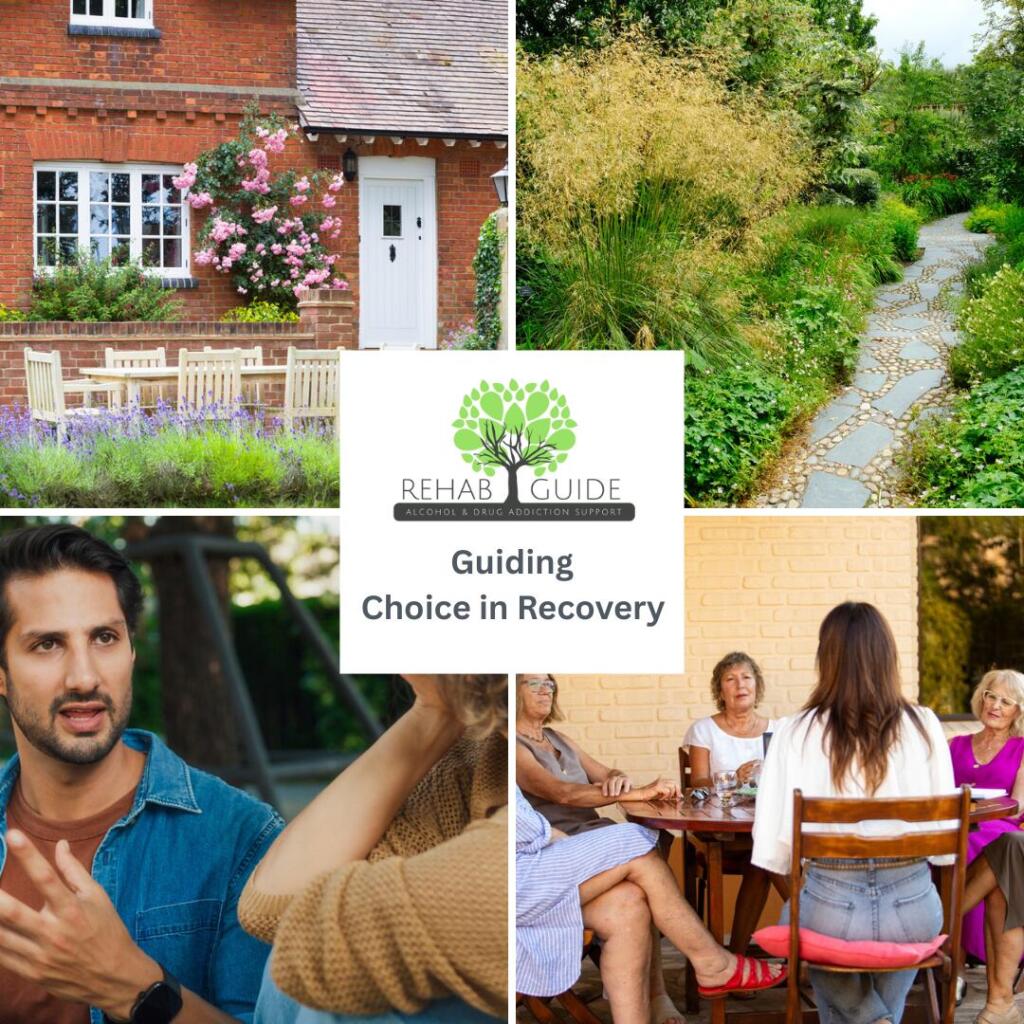What is a rehab centre?
There are still many misconceptions about what a drug or alcohol rehab centre actually is and how to choose the right place for you. Some people picture cold, clinical environments, almost like institutions or prisons. Others associate rehab with weakness, as if turning to a centre means admitting defeat or proving you’re incapable of sorting your life out alone. But those ideas tend to come from misunderstanding, not reality.
Rehab isn’t about being punished or talked down to. It’s about getting support in a space where you’re allowed to focus on your health, without shame or pressure. Concentrated treatments are at the heart of inpatient rehab and finding what works for you and your addiction.
At its core, a rehab centre is a place designed to help people rebuild their lives. Below, we take a look at some of the ways rehab centres help:

It’s a place that gives you space to breathe
Most rehab centres offer a calm and peaceful environment where daily stressors are removed, giving you the chance to reset and recover with fewer distractions. Some centres feel more like homely retreats than medical clinics, with quiet gardens, shared spaces and private rooms where people can reflect and reconnect.
A structured setting for real progress
One of the most important parts of rehab is the routine. Addiction often throws life into chaos, making everything feel unpredictable and exhausting. Rehab replaces that chaos with a steady rhythm. From shared mealtimes to regular therapy sessions, the structure of each day is designed to give you stability. That consistency helps create space for progress.
Expert help without judgment
Support isn’t limited to a single type of therapy, either. Depending on the centre, you may have access to group sessions, one-to-one counselling, creative or movement-based therapies and time to rest. And behind every session is a team of professionals who understand what you’re going through and know how to help, not judge.
What makes a rehab centre different from trying to get better on your own is the environment it creates. It removes you from your usual triggers, offers space to breathe and provides the kind of expert help that can turn short-term recovery into long-term change.

A week in the life of a rehab centre
No two journeys through rehab are the same, but many follow a similar path during the first week. What follows is a fictional, yet very real, account of what someone with an alcohol addiction might experience when they first arrive. While rehab programmes can vary in length and structure, this example is designed to give you a sense of what the first seven days might look like.
Meet David.
He’s 42, works in logistics and has spent the last few years drinking more than he ever thought he would. It started as a way to unwind after work but things slowly crept out of control. After several attempts to cut down on his own, David finally reached out and booked into a rehab centre.
Day one: arrival and assessment
David arrives feeling nervous. His hands shake slightly, and his voice is quieter than usual. He’s greeted by a member of staff who shows him around, helps him settle into his room and offers reassurance. After some time to unpack, he sits down with a therapist for an initial assessment.
This assessment is one of the most important steps in the rehab process. It helps the team understand David’s history with alcohol, his current physical health, any co-occurring mental health concerns and what kind of support will work best for him. The outcome of the assessment shapes his personalised care plan for the coming weeks.
By the evening, David is tired but grateful he came.
Day two: detox begins
Because David had been drinking heavily for several years, the team recommends a supported detox. His body has developed a dependency on alcohol, so stopping suddenly could be dangerous. In a rehab centre, detox is monitored with care. Staff are there around the clock to help manage withdrawal symptoms and to make sure everything goes as safely and comfortably as possible.
The first night is rough. David struggles to sleep and feels nauseous, but he’s not alone. Nurses check on him regularly and offer encouragement. Even just knowing he’s in the right place makes it easier to get through.
Day three: symptoms and support
David’s withdrawal symptoms peak on day three. His body feels heavy, and his emotions are all over the place. There’s anger. Sadness. Regret. But there’s also support. A therapist checks in, and David starts journaling how he feels. He’s encouraged to attend a group therapy session, even if he doesn’t want to speak. Just listening, they say, can be powerful.
He sits in a circle of strangers, many of whom are further along in their recovery. One man talks about how he used to drink in secret. A woman shares how she finally started sleeping again. David doesn’t say much, but he nods. There’s comfort in the shared experience.
Day four: first steps into therapy
David is now starting to feel more physically stable. His shakes have reduced, and he’s eating properly again. He meets one-on-one with a therapist to start deeper work. They explore the root of his drinking, the thoughts and patterns that kept pulling him back in and the feelings he had tried to numb.
Therapy isn’t easy. But it doesn’t feel clinical either. It feels like someone finally understands.
That afternoon, David attends a mindfulness group. He finds it difficult to sit still at first, but over time, he starts to feel more grounded. The centre encourages these holistic therapies to help with emotional regulation and long-term healing.
Day five: routine and reflection
By now, David is falling into a rhythm. He wakes up at the same time each day, eats nutritious meals, attends therapy sessions and takes part in optional activities. Today, there’s an art therapy group. He’s never done anything like this before, but he finds it oddly calming.
He also speaks with a support worker about his home life. There are conversations about boundaries, relationships and how to create a safer environment when he leaves. It’s the first time he’s considered what happens after rehab, and while the idea is daunting, it helps to know they’re thinking ahead for him.
Day six: opening up
David starts to talk more during group sessions. He opens up about his drinking, the arguments it caused and how ashamed he still feels. No one flinches. No one looks shocked. In fact, several heads nod in understanding.
One member of the group tells him, “You’re not the only one who feels that way”, and in that moment, David finally believes it.
That evening, he meets his keyworker to review his progress so far. Together, they talk about goals, fears and the next steps. It’s not a full recovery yet, but it’s a start.
Day seven: planning ahead
The final day of the week is about looking forward. David is given information in regards to aftercare, which includes weekly check-ins, continued therapy sessions and access to alumni support.
Aftercare is one of the most important parts of the rehab journey. It helps ensure the work done inside the centre continues beyond its walls. For David, it means he’ll have someone to call if he’s struggling and a plan to stay connected with his recovery community.
He also reflects on the week. Seven days ago, he arrived feeling broken. Now, while he knows there’s a long road ahead, he feels steadier. He’s had a glimpse of life without alcohol, and for the first time in a long time, that life feels possible.
Do rehab programmes finish after 1 week?
Rehab doesn’t stop at day seven. For many, that first week is just the beginning. Programmes can last anywhere from two weeks to several months, depending on individual needs. Some people benefit from longer stays, especially if their addiction is severe or if they’re working through additional issues like trauma or anxiety.
What’s important to remember is that progress happens gradually. Detox might clear the body, but therapy is what helps heal the mind. Relationships take time to rebuild, confidence takes time to return and staying sober outside of the centre brings new challenges.
But with the right support, recovery is possible. That first week, fictional as David’s might be, is one that thousands of people experience every year as they take that first step toward change.
When is it time to consider a rehab centre?
There’s no perfect moment to begin rehab. You don’t need to wait until you’ve reached a certain level of addiction or until a crisis hits. In fact, some of the most successful recovery stories start when someone simply begins to wonder if their relationship with drugs or alcohol is getting out of hand.
Whether you’re deep in a dependency or just starting to question your behaviour, it’s never too soon or too late to reach out for help. The earlier someone gets support, the better their chances of recovery, but there’s no set rule for when that should happen.
That said, there are signs that can help you decide whether a rehab centre might be the right next step. Some people recognise these signs in themselves, while others may see them more clearly in someone close to them. While these signs don’t cover every possibility, they can help highlight when support is urgently needed.

Signs I urgently need to find a rehab centre
- You’ve tried to stop using substances before, but you always return to them.
- Your health is declining, and you’ve noticed problems with sleep, appetite or mental clarity.
- You’re hiding your use from others or lying about how much you’re taking.
- You feel overwhelmed by guilt or shame and don’t know how to stop.
- You’ve started avoiding friends, family, or work to continue using.
- You experience symptoms like shaking, sweating or anxiety when you don’t use.
- Something recent has scared you, like a hospital trip or an argument that got out of control.
Signs my loved one needs to urgently find a rehab centre
- Their drug or alcohol use is increasing in frequency or quantity.
- You’ve noticed changes in their appearance or hygiene that concern you.
- Their behaviour is unpredictable and they often seem angry, withdrawn or confused.
- They’re pulling away from loved ones and spending more time alone.
- There have been issues with money, the law or their job that they won’t talk about.
- They deny there’s a problem, even when it’s clearly affecting their life.
- You’re constantly worried about them and don’t know how to help.
How can I find a rehab centre near me?
Finding the right rehab centre can feel overwhelming, especially when you’re trying to make the best choice for yourself or someone you care about. That’s where Rehab Guide comes in. We listen to your needs and help match you with a rehab centre that fits your circumstances, location and budget. We can also take into account personal preference for things like 12-step programs and spiritual wishes.
Whether you’re ready to take that first step today or just want some honest advice, we’re here to guide you without pressure or judgment.
Contact Rehab Guide now and let’s find the help that’s right for you.
FAQs
What are the benefits of choosing a top rehabilitation centre over a standard facility?
Top rehabilitation centres often offer better therapy options, more experienced staff and personalised rehabilitation services, helping increase the chances of long-term recovery success. Rehab doesn’t have to cost the earth to be good quality, in fact, often in widely known rehab centres like the Priory, you are paying more for the prestige.
Are there good drug rehab centres specifically for young people?
Yes. Teenage addiction rehab programmes are designed to meet the emotional, psychological and social needs of young people, with age-appropriate therapy in safe rehab units.
How do I know which are the best rehab places for my needs?
The best rehab places match your personal situation, whether you need residential addiction rehab, rehabilitation for mental health or a centre closer to your city.
What should I expect when staying in a rehabilitation facility?
Rehabilitation facilities usually offer detox, therapy and ongoing support. Whether it’s a rehab hospital or city rehab, structure and care are central to recovery.

Fiona Kennedy is an editor and content manager who earned her Master of Arts degree from the University of Edinburgh, followed by completing the CELTA Cambridge teaching course in English. She has worked as an editor, writer and personal coach. Coming from a family deeply involved in the rehabilitation and support of those suffering from addiction, she is passionate about helping people to understand and take control of their dependences. Fiona’s other passions include travelling and taking part in community projects.


